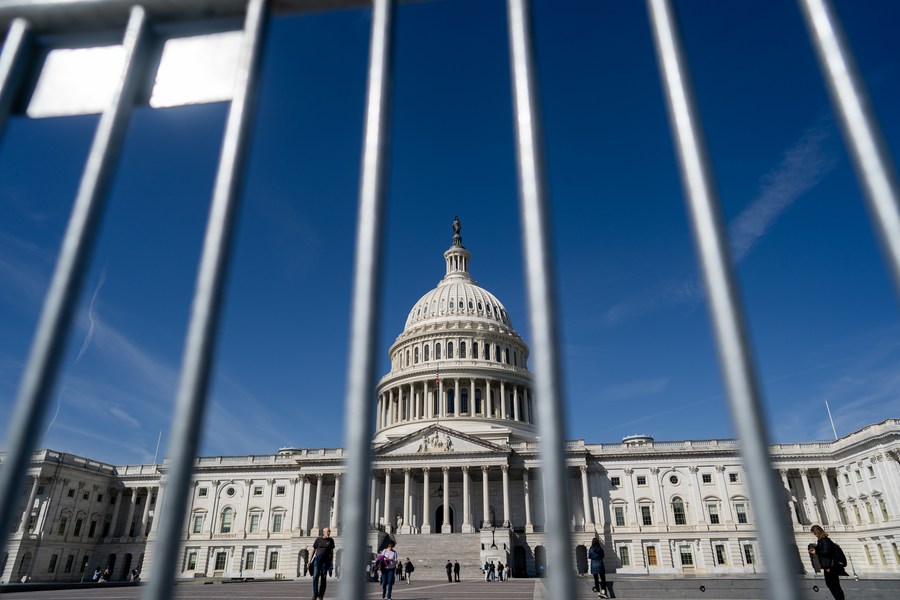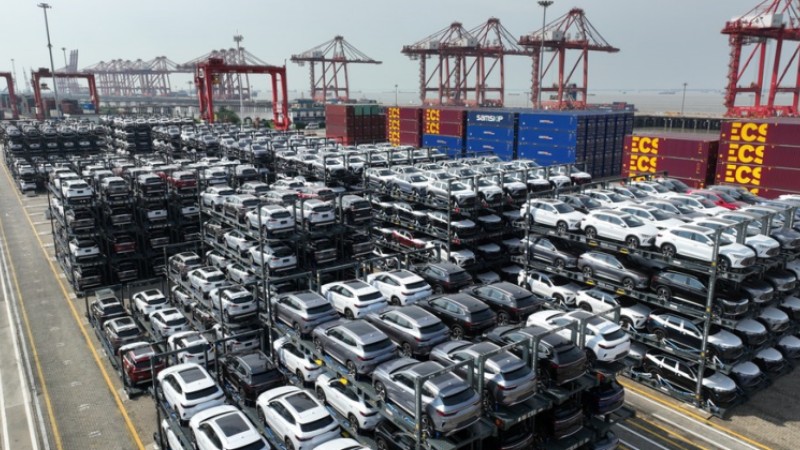Opinion: Biden's "small yard and high fence" strategy will end in disaster

This photo taken on March 21, 2023 shows metal barricades placed near the Capitol building in Washington, D.C., the United States. (Xinhua/Liu Jie)
It is impossible for the world's top two economies, which enjoy significant economic complementarity, to de-couple from each other. Doing so would devastate the United States and the world.
BEIJING, Aug. 16 (Xinhua) -- U.S. President Joe Biden's tech and investment ban, the latest policy move in a "small yard and high fence" strategy against China, could easily backfire and cost Washington dearly.
The strategy, pioneered by Samm Sacks, a senior researcher at the New America think tank, in 2018, was quick to win the hearts of a group of American policymakers who touts technology blockade against China in the name of national security.
Starting from the Trump era, as the name suggests, the policy is like building a huge wall and cutting off links between China and the United States in the high-tech field.
Last week, White House senior administration officials used the words "narrow" and "narrowly" no fewer than 10 times in half an hour while briefing reporters on Biden's executive order restricting American investment in China.
They emphasized that new rules would reach just three "national security sensitive technologies" -- advanced semiconductors, quantum computing and artificial intelligence.
Biden might think this "small yard and high fence" strategy could preserve America's technological primacy by cutting China off from advanced computer chips. Good luck. But can the strategy prevent economic losses from spilling to other industries?
In fact, there is no such thing as a precision strike on a particular industry that could leave other industries intact -- the benign and intelligent global supply mechanism only results in a more oversized yard that no fences could confine.
Free markets quickly adapt to find the cheapest way to supply goods to consumers. With its vast workforce and efficient logistics, China remains the most affordable supplier for many countries.
Washington's new investment ban might have the power to redirect its own trade with China, but it cannot rid the entire supply chain of Chinese influence. In essence, America's reliance on Chinese critical inputs remains intact.
While America redirects its demand from China to other countries, production in those places increases dependence on Chinese inputs.
For example, while Southeast Asia's exports to America have risen, its imports of intermediate inputs from China have exploded.
Mexico, which also benefited from American de-risking from China, has increased its imports from China.
Even in advanced-manufacturing sectors, where America is keenest to retreat from China, the countries that have made the most inroads into the American market are those with the closest industrial links to China, according to the International Monetary Fund.
Supply chains have become more complex, and trade has become more expensive, further burdening enterprises and slowing the recovery of the world economy.
The Biden administration has seriously miscalculated with the controls meant to hurt China and curb its high-tech development because American industries stand to lose. The self-sabotaging policy will shut off a piece of the lucrative Chinese market for many American companies.

A staff member checks chip products at Nanjing V-Test Semiconductor Technology Co., Ltd. in Pukou Economic Development Zone of Nanjing, east China's Jiangsu Province, March 9, 2023. (Xinhua/Ji Chunpeng)
Semiconductor Industry Association statistics show that China is the world's largest single semiconductor market, accounting for 180 billion U.S. dollars in chip purchases last year, or more than a third of the world's total. In 2019, 36 percent of all U.S. chip sales came from China.
Intel CEO Pat Gelsinger and Nvidia President Jensen Huang said that access to the Chinese market is crucial to investment in America. Profits realized in China can be reinvested at home, and meeting Chinese demand provides the impetus for building U.S. capacity.
"If I have 25 percent to 30 percent less market, I need to build less factories," said Gelsinger at the Aspen Security Forum held on July 18-21.
"If the American tech industry requires one-third less capacity (due to the loss of the Chinese market,) no one is going to need American fabs, we will be swimming in fabs," the Financial Times quoted Huang as saying in May.
Moreover, Washington can never stop China's iron will to develop its high-tech industry. Beijing is bent on raising the living standards of its people, and ample evidence has shown that China's development has extended beyond itself and brought tangible benefits to other countries worldwide.
It is hoped that the Biden administration will come to its senses and realize that the "small yard and high fence" strategy is irrational. It is impossible for the world's top two economies, which enjoy significant economic complementarity, to de-couple from each other. Doing so would devastate the United States and the world.
Photos
Related Stories
- Biden reportedly to create Grand Canyon national monument to block new mining
- Texas sued by Biden admin over building water barriers to block migrants crossing border
- Texas sues Biden gov't over new asylum rule
- Australian PM cancels Quad meeting next week after Biden pulls out due to domestic debt ceiling stalemate
- Biden to cut short Asia-Pacific trip due to debt ceiling stalemate: media
Copyright © 2023 People's Daily Online. All Rights Reserved.









